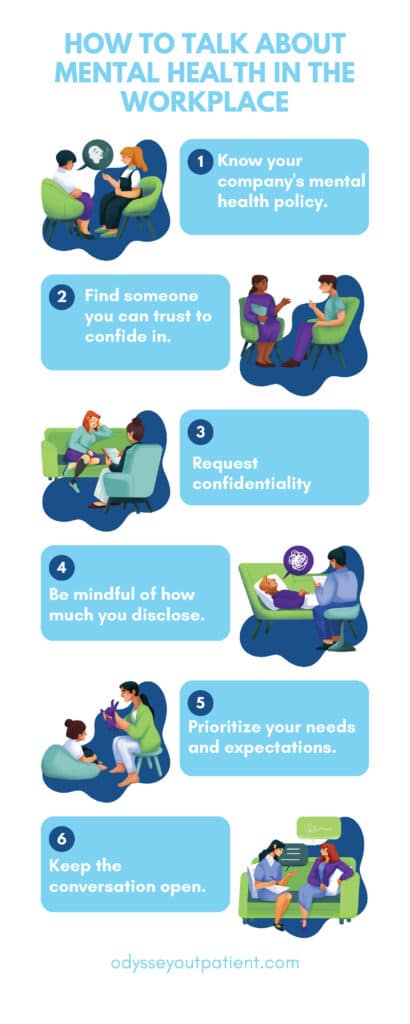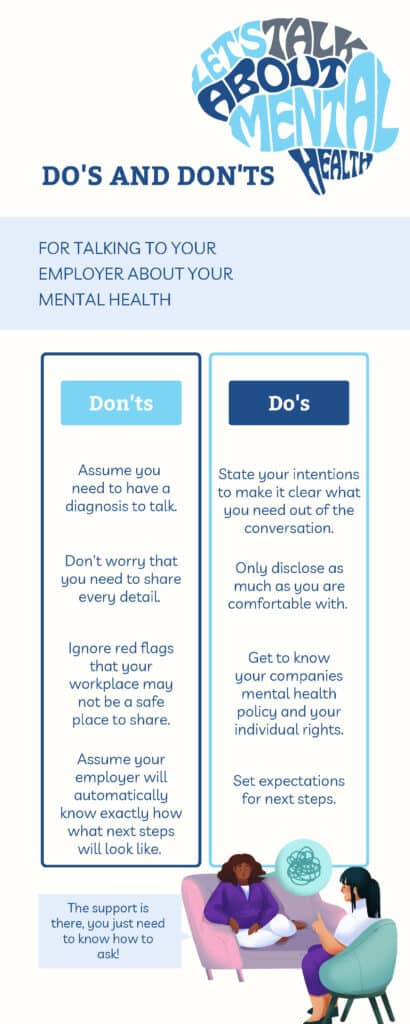Why Talking About Mental Health at Work Matters
Mental health challenges are far more common than most realize — up to 80% of people will experience a diagnosable mental health condition at some point in their lives. Yet, nearly 60% of employees have never spoken to anyone at work about it.
Opening up about your mental health can feel intimidating due to stigma, privacy concerns, or fear of career repercussions. However, having the conversation can unlock vital resources, legal protections, and support that help you maintain both your well-being and your career.
Know Your Rights + Benefits Before You Speak Up
Before starting the conversation, do your research. Understanding the policies, benefits, and legal protections available can help you feel more confident and prepared.
1. Check Your Employee Benefits
Review your company’s Employee Assistance Program (EAP) if available.
An EAP is a confidential, employer-sponsored service that can connect you with counseling, wellness programs, and crisis support at no cost.Look in your employee handbook or HR portal under “Benefits,” or ask HR directly.
2. Understand Your Legal Protections
Americans with Disabilities Act (ADA) + ADA Amendments Act (ADAAA):
These laws protect employees with qualifying mental health conditions from discrimination and ensure reasonable accommodations.Family + Medical Leave Act (FMLA):
If your condition qualifies, you may be eligible for job-protected leave to address your mental health.
3. Examples of Reasonable Workplace Accommodations
Flexible work schedules for therapy or medical appointments
A quieter workspace or noise-canceling devices
Adjusted supervisory methods (e.g., written instructions)
Remote work options
Changes to workplace policies that support mental health needs
Preparing for the Conversation
A successful discussion with your employer starts with careful preparation.
Tips to Get Ready:
Identify your goal. Decide if you’re requesting an accommodation, taking leave, or simply informing them.
Choose the right person. Start with HR, if available. If not, approach a trusted manager or supervisor.
Plan your talking points. Be clear, concise, and focus on how the workplace can support you.
Request confidentiality. While HR must keep your information private, managers may have different guidelines.
How to Talk to Your Employer About Your Mental Health
Step-by-Step Conversation Guide:
Start with gratitude and context.
“I value my work here and want to continue performing at my best. Recently, I’ve been managing a mental health condition that’s been affecting my ability to focus.”Share as much — or as little — as you’re comfortable with.
You’re not required to disclose your diagnosis. Focus on the impact on your work and what support you need.Make a clear request.
“I’d like to discuss adjusting my schedule on Thursdays so I can attend therapy.”Stay solutions-focused.
Position accommodations as ways to help you remain productive and engaged.
If the First Conversation Doesn’t Go as Planned
Not every workplace responds perfectly.
Give the process time and document all interactions.
If needed, escalate to HR, your company’s legal department, or the EEOC for ADA-related concerns.
Seek support from advocacy organizations like the National Alliance on Mental Illness (NAMI).
Breaking the Stigma
Being open about mental health at work helps create a culture of trust and acceptance. Your willingness to speak up may encourage others to do the same — building a healthier workplace for everyone.
If your mental health is affecting your daily life or work performance, you don’t have to manage it alone. Learn how Pasadena Villa Outpatient can help you access care and resources that fit your needs.


Frequenty Asked Questions
Will I lose my job?
Will I get paid if I take a leave of absence?
Will I still be able to keep my health insurance?
Will I still be eligible for promotions if my productivity is impacted or if I take a leave of absence?
It’s illegal to be discriminate against someone’s mental health, however, not every company views mental health as equally important. Be mindful of how much you disclose and how you approach the conversation.
Will my employer have access to my diagnosis or other medical information?
Will there be negative ramifications in response to my medication management?
What is the confidentiality policy?
Legally, your medical information is confidential, however, depending on how you disclose it and with who, your company may have a different policy. Just remember that you can always request confidentiality.

